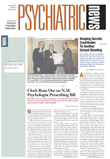Could siring a child later in life increase that child’s risk of developing schizophrenia? A new study conducted by New York City and Israeli scientists and reported in the April Archives of General Psychiatry suggests that it might.
The study was headed by Dolores Malaspina, M.D., of the New York State Psychiatric Institute (NYSPI) in New York City. Her colleagues included Ezra Susser, M.D., Ph.D., also of NYSPI; Susan Harlap of New York University School of Medicine; Shmuel Fennig, M.D., and Dov Heiman of the Ministry of Mental Health in Even-Yehuda, Israel; and Daniella Nahon and Dina Feldman of the Israel Ministry of Health in Tel Aviv.
Malaspina and her team tapped a large database in Israel to conduct their study. It contained not only detailed birth records about a large number of citizens—some 88,000 born in Jerusalem from 1964 to 1976—but also detailed information about which of these citizens later developed psychiatric disorders. Of the 1,337 who fell into this category, 658 had been diagnosed with schizophrenia.
Malaspina and her team then scrutinized the birth records of these 658 subjects to learn how old their fathers and mothers had been when they were born. Taking gender, education, and other possibly confounding factors into consideration, they found a link between paternal, but not maternal, age and schizophrenia incidence. Intriguingly, there seemed to be a progressively greater risk of siring a schizophrenia-prone child as a man became older (
see table). In sum, they found a fourfold difference in risk for schizophrenia between the youngest and oldest paternal age categories.
The researchers also examined the birth records of the 679 persons who had been diagnosed with psychiatric disorders other than schizophrenia to see whether there was an association between paternal age and those disorders, and none was found. So they believe that advancing paternal age is a risk factor for schizophrenia, but not for the other psychiatric disorders they examined. In fact, they conclude, advancing paternal age is “a strong and significant predictor” of a schizophrenia diagnosis.
If advanced paternal age can indeed help set the stage for schizophrenia in one’s offspring, what is the mechanism? Since sperm-producing cells undergo continual cell division throughout a man’s lifetime, which is not the case for egg-producing cells during a woman’s lifetime, the chances of sperm acquiring gene mutations would presumably increase as a man grows older. And one or more of these gene mutations might in turn trigger schizophrenia. Or as Malaspina and her coworkers wrote: “Although schizophrenia is a heterogeneous disorder, [believed] to result from both genetic and environmental origins, these results suggest that de novo genetic mutations may substantially contribute to the risk for schizophrenia.”
“This is an excellent and creative hypothesis,” Elliott Gershon, M.D., chair of psychiatry at the University of Chicago, said in an interview with Psychiatric News. “It suggests a new mechanism for susceptibility to schizophrenia. I certainly hope it will be confirmed in other samples.”
If confirmed, Malaspina and her coworkers pointed out, it could have some practical implications for the search for schizophrenia genes. For instance, cases of schizophrenia due to late fathering–provoked gene mutations might be separated from cases presumably due to dominant or recessive genes passed down through generations in a family. This way, the chances of identifying genes responsible for the latter kinds of schizophrenia might be greater.
The study, “Advancing Paternal Age and the Risk of Schizophrenia,” is posted on the Web at archpsyc.ama-assn.org. ▪
